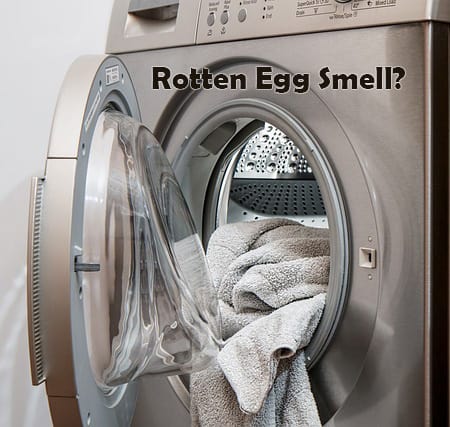Washing Machine Smells Like Rotten Eggs: Causes and Solutions
If you’ve ever experienced the unpleasant odor of rotten eggs coming from your washing machine or your laundry room, you’re not alone.
This common issue can be quite bothersome, but the good news is that there are ways to address and eliminate these foul smells.
Table of Contents
In this article, we’ll explore the causes behind the odor and provide you with practical solutions to get your washing machine smelling fresh again.
Washing Machine Smells Like Rotten Eggs: Common Causes
Bacterial Growth Due to Bad Water Quality
One of the leading causes that can make a washing machine smells like rotten eggs is the growth of bacteria inside your front load washer.
Over time, bacteria can accumulate in the machine, especially in warm and damp environments. The bacteria break down organic matter, resulting in the release of hydrogen sulfide gas, which has a distinctive rotten egg smell.
One thing that can further help the growth of bacteria and that rotten egg smell in your washing machine is microbiologically unsafe water.

Higher Concentration of Hydrogen Sulfide
Hydrogen Sulfide is a natural gas that has an odor like rotten eggs. When it is in higher concentrations, and used by a washing machine, it can be the cause of that unpleasant smell.
As the water is tumbled in the washer during the spin cycle, the hydrogen sulfide gas gets out from the water, and it collects in the washer drum.
The gas can’t get out through the drain, and when you open the door, here’s that rotten eggs smell.
This is a very often situation in a top load washer and the reason that your washing machine smells like rotten eggs.
Clogged Drain
Another culprit behind the foul odor could be a clogged drain hose. When the drain hose gets obstructed, water remains stagnant, creating an ideal breeding ground for bacteria and mold.
As the water sits, it starts emitting an unpleasant smell that can be similar to rotten egg smell.
Mold and Mildew
Mold and mildew thrive in moist environments, and your washing machine provides the perfect conditions for their growth.
If you notice a musty or rotten egg smell in your laundry room, it could indicate the presence of mold or mildew inside the machine.
These fungi release volatile organic compounds (VOCs) that contribute to the unpleasant odor.
Dirty Drum
A dirty drum can also be a source of foul smells in your front load washer. Over time, detergent residue, fabric softener, and lint can accumulate inside the drum, creating a breeding ground for bacteria.
This buildup can result in an unpleasant odor, similar to that of rotten eggs.
Tips to Eliminate Washing Machine Rotten Egg Smell
Now that we understand the common causes of washing machine odors, let’s delve into some effective solutions to tackle this issue head-on.
Use good quality water
Increased water hardness, increased iron content, hydrogen sulfide content, microbiologically unsafe water, can all influence the operation quality of a washing machine.
Limescale and iron deposits are ideal for microbiology growth environment.
Hydrogen sulfide, especially when the water is heated, gives that rotten egg smell.
Regular Cleaning Routine
Establishing a regular cleaning routine is crucial for keeping your washing machine smelling fresh. After each laundry cycle, wipe down the drum and door seal to remove any residue or moisture. Additionally, periodically clean the detergent dispenser, lint filter, and other removable parts.
Use Vinegar or Baking Soda
Vinegar and baking soda are natural deodorizers and can effectively eliminate unpleasant smells from your washing machine. To use vinegar, pour two cups into the detergent dispenser and run a hot water cycle without any clothes. If you prefer using baking soda, sprinkle half a cup directly into the drum before running a hot water cycle.
Clean the Filter and Drain
Regularly inspect and clean the filter and drain of your washing machine to prevent any clogs. Remove any lint, debris, or foreign objects that may have accumulated in these areas. By ensuring proper drainage, you can reduce the chances of stagnant water and foul odors.
Leave the Washing Machine Door Open
Leaving the washing machine door open after each use can help prevent the buildup of moisture and mold. By allowing air to circulate, you reduce the chances of a foul odor developing.
Remember to keep the door open for a few hours or until the interior of the machine is completely dry.
Preventive Measures for Long-Term Odor Control
In addition to addressing the immediate causes of washing machine smells, implementing preventive measures can help maintain a fresh-smelling machine in the long run.
Check your water quality
Be sure to use only microbiologically safe water. Also, check for increased hydrogen sulfide, iron content as well as water hardness levels.
Use High-Efficiency Detergent
Using high-efficiency (HE) detergent is essential for both the cleanliness of your clothes and the health of your washing machine. HE detergents are formulated to produce fewer suds, which means there is less residue left behind in the drum. This reduces the chances of bacterial growth and unpleasant odors.
Avoid Overloading the Machine
Overloading your washing machine can lead to poor cleaning performance and increase the likelihood of odors. Make sure to follow the manufacturer’s recommendations regarding load capacity. By allowing enough space for clothes to move freely during the wash cycle, you prevent excess moisture and detergent buildup.
Remove Wet Clothes Promptly
Leaving wet clothes sitting in the machine for extended periods can contribute to mold and mildew growth. As soon as the washing cycle is complete, promptly remove the clothes and transfer them to the dryer or hang them up to dry. This simple step can go a long way in preventing odors from developing.
Keep the Machine Dry
After each use, take the time to dry the drum and any other accessible parts of your washing machine. Use a clean cloth or towel to wipe away any moisture, paying extra attention to the door seal and detergent dispenser. Keeping the machine dry helps inhibit the growth of bacteria and mold.
Check the rubber seal
Sometimes the problem can be found at the rubber seal creases. Check it out with your fingers, and if you feel there are slimy deposits, try to wipe them out.
Take care not to damage the rubber seal of your front load washer.
Seeking Professional Help
If you’ve tried the above solutions and still struggle with persistent washing machine odors, it may be time to seek professional assistance.
A qualified appliance technician can inspect your machine for any underlying issues and provide necessary repairs or maintenance. They have the expertise to diagnose and resolve problems that may be causing the foul smells.
Conclusion
Dealing with a problem that your washing machine smells like rotten eggs can be unpleasant, but it’s a common issue.
By understanding the causes of your washing machine smell and implementing effective solutions, such as regular cleaning, using natural deodorizers, and practicing preventive measures, you can keep your washing machine smelling fresh and clean.
Remember to maintain good laundry habits and seek professional help if needed.
Frequently Asked Questions (FAQs)
- Q: Why does my washing machine smell like rotten eggs when it runs?
A: While the washing machine runs, it has a flow of water to drain outlet. Check the drain plug, this is where a part of hydrogen sulfide gets out from the machine, and this can be the cause of smell. The drain plug should be tight, so no air can get out. - Q: Why does it smell like rotten eggs in my laundry room?
A: The cause of smelling rotten eggs is again the hydrogen sulfide smell that comes out from the drain. Try to make a better connection of your washing machine and the drain. Also, the rotten egg smell coming floor drain is a possible situation. The smell could come from there too, while the washing machine is running. - Q: How often should I clean my washing machine?
A: It is recommended to clean your smelly washing machine at least once a month to prevent odor and soap scum buildup. - Q: Can I use bleach to remove washing machine odors?
A: While bleach can be effective in killing bacteria, it is not recommended for cleaning washing machines as it can damage certain components. Try vinegar or baking soda instead. Take care not to damage the rubber gasket. - Q: What can I do if the washing machine smells bad even after cleaning?
A: If the smell persists, consider seeking professional help from an appliance technician who can diagnose and address any underlying issues. - Q: Is it necessary to use high-efficiency detergent?
A: Yes, using high-efficiency detergent is essential for proper cleaning and odor control in modern washing machines. - Q: Can leaving the door open damage the washing machine?
A: No, leaving the door open after each use helps prevent moisture buildup and does not cause any harm to the machine.

Who am I?
I am working as a water treatment technical manager and I have more than 25 years of practical experience in water purification.
Water purification expert
After many years of experience in water purification, I want to share some of my knowledge and get people to know the real importance of water quality.
Water purification and water treatment are very complex themes, so it is important to explain them in an easy-to-read way.
On this blog, you will find many understandable, easy-to-read information about water purification.
I hope you enjoy it, find some useful information, and thank You for reading.
More info on my work and my expertise on water purification can be found on my LinkedIn profile.






